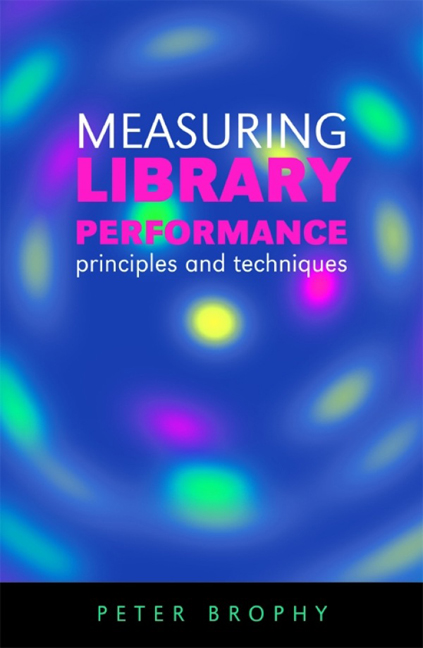Book contents
- Frontmatter
- Contents
- List of figures
- List of tables
- Preface
- Acronyms and abbreviations
- 1 Background
- 2 Theoretical considerations
- 3 User satisfaction
- 4 Impact on users
- 5 Social and economic impact
- 6 Inputs
- 7 Processes
- 8 Outputs
- 9 Staff
- 10 Infrastructure
- 11 Services for all
- 12 Benchmarking
- 13 The balanced scorecard
- 14 Standards
- Appendix 1 Data collection methods
- Appendix 2 The analysis of data
- Appendix 3 The presentation of results
- Index
5 - Social and economic impact
Published online by Cambridge University Press: 08 June 2018
- Frontmatter
- Contents
- List of figures
- List of tables
- Preface
- Acronyms and abbreviations
- 1 Background
- 2 Theoretical considerations
- 3 User satisfaction
- 4 Impact on users
- 5 Social and economic impact
- 6 Inputs
- 7 Processes
- 8 Outputs
- 9 Staff
- 10 Infrastructure
- 11 Services for all
- 12 Benchmarking
- 13 The balanced scorecard
- 14 Standards
- Appendix 1 Data collection methods
- Appendix 2 The analysis of data
- Appendix 3 The presentation of results
- Index
Summary
■ Introduction
Direct impact on individuals, and on the specific groups which the library serves, has been discussed in the last chapter. However, alongside that kind of impact measurement, there has been growing interest among librarians in recent years in trying to assess the broader social and economic impacts of their services. In other words, what does the library mean in terms of the development and sustenance of communities and societies? What does the existence of a library add to the economic performance of a city, region or nation?
■ Social impact
Studies of social impact start from the observations that all organizations have effects on the societies within which they operate, that they have responsibilities to those societies and that the extent of their impact needs to be monitored and assessed. The concepts of social responsibility and social impact were brought into sharp focus by the events of 3 December 1984 at Bhopal in India:
Shortly after midnight poison gas leaked from a factory in Bhopal, India, owned
by Union Carbide Corporation. There was no warning, none of the plant's
safety systems were working. In the city people were sleeping. They woke in
darkness to the sound of screams with the gases burning their eyes, noses and
mouths. They began retching and coughing up froth streaked with blood.
Whole neighbourhoods fled in panic, some were trampled, others convulsed
and fell dead…. Within hours thousands of dead bodies lay in the streets.
(www.bhopal.net/index1.html)Subsequently the factory's owner, the Union Carbide Corporation, a subsidiary of the Dow Chemical Company, had to pay $470 million in a legal settlement. The company's website states: ‘Since the time of the incident, the chemical industry has worked to voluntarily develop and implement strict safety and environmental standards to help ensure that an incident of this type never occurs again’ (www.bhopal.com/).
Partly as a result of incidents like this, it is now accepted that good governance requires that all organizations monitor and take positive action on their impacts on society, with responsibilities going far beyond mopping up after adverse effects have been noticed. It is also worth noting that, while in the UK and USA shareholders still remain dominant, in many other countries a much broader view of corporate stakeholding is taken.
- Type
- Chapter
- Information
- Measuring Library Performanceprinciples and techniques, pp. 77 - 89Publisher: FacetPrint publication year: 2006



